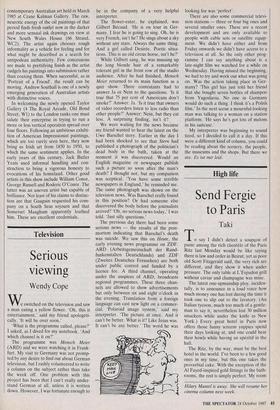Television
Serious viewing
Wendy Cope
We switched on the television and saw a man eating a yellow flower. 'Oh, this is entertainment,' said my friend apologeti- cally. 'It will be over soon.'
'What is the programme called, please?' I asked, as I dived for my notebook. 'And which channel is it on?'
The programme was Mensch Meier (ARD) and we were watching it in Frank- furt. My visit to Germany was not promp- ted by any desire to find out about German television, but I rashly volunteered to write a column on the subject rather than take the week off. One problem with this project has been that I can't really under- stand German at all, unless it is written down. However, I was fortunate enough to be in the company of a very helpful interpreter.
The flower-eater, he explained, was Gilbert Becaud. 'He is on tour in Ger- many. I fear he is going to sing. Oh, he is very French, isn't he? He sings about a sky without any stars. Always the same thing. And a girl called Desiree. Poetic situa- tions. This is an old circus horse, isn't he?'
While Gilbert sang, he was mussing up the long blonde hair of a remarkably tolerant girl in the front row of the studio audience. After he had finished, Mensch Meier returned to its main function as a quiz show. Three contestants had to answer Ja or Nein to the questions. 'Is it true that 75 per cent of Americans don't smoke?' Answer: Ja. 'Is it true that owners of video recorders listen to less radio than other people?' Answer: Nein, but they eat less. A surprising finding, isn't it?
We were waiting for the news because my friend wanted to hear the latest on the Uwe Barschel story. Earlier in the day I had been shocked to see that Stern had published a photograph of the politician's dead body in the bath, taken at the moment it was discovered. Would an English magazine or newspaper publish such a picture so soon after the man's death? I thought not, but my companion was sceptical. 'You have some terrible newspapers in England,' he reminded me. The same photograph was shown on the television news. Was Barschel really found in this position? Or had someone else discovered the body before the journalists arrived? 'Oh, no serious news today,' I was told. 'Just silly questions.'
The previous day there had been some serious news — the results of the post- mortem indicating that Barschel's death was suicide. We saw this on Heute, the early evening news programme on ZDF. ARD (Arbeitsgemeinschaft der Rund- funkenstalten Deutschlands) and ZDF (Zweites Deutsches Fernsehen) are both under public control and funded by a licence fee. A third channel, operating under the auspices of ARD, broadcasts regional programmes. These three chan- nels are allowed to show advertisements but only between six and eight o'clock in the evening. Translation from a foreign language can cast new light on a commer- cial. 'Polaroid image system,' said my interpreter. 'The picture at once. And it can't be better. What is it? Like Jesus was. It can't be any better.' The word he was looking for was 'perfect'.
There are also some commercial televi- sion stations — three or four big ones and several smaller ones. These are a recent development and are only available to people with cable sets or satellite equip- ment. We didn't have either and from Friday onwards we didn't have access to a television at all. So the only other prog- ramme I can say anything about is a late-night film we watched for a while on Wednesday. Having missed the beginning, we had to try and work out what was going on. Was the action taking place in Ger- many? 'This girl has just told her friend that she bought seven bottles of shampoo from Yugoslavia. No one in Germany would do such a thing. I think it's a Polish film.' In the next scene a mournful-looking man was talking to a woman on a station platform. 'He says he's got lots of melons in his suitcase.'
My interpreter was beginning to sound tired, so I decided to call it a day. If this were a different kind of column, you could be reading about the scenery, the people, the museums and the shops. But there we are. Es tut mir leid.


















































 Previous page
Previous page